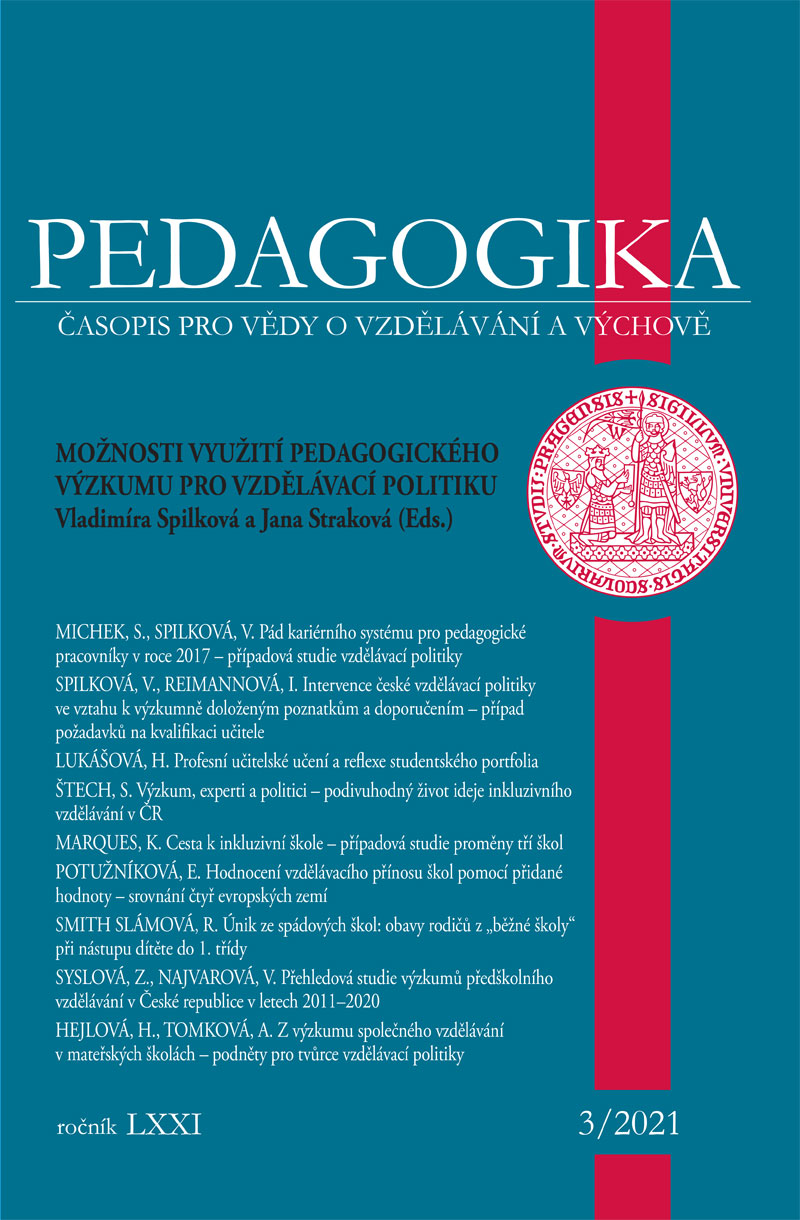From Research on Inclusive Education in Kindergartens – Issues for Educational Policy Makers
DOI:
https://doi.org/10.14712/23362189.2021.974Keywords:
preschool education, personality-oriented concept of education, inclusive education, pedagogical processes, qualitative researchAbstract
Our research traced the ways in which teaching and teaching conditions in kindergartens have changed because of the introduction of inclusive education in the updated Framework Educational Programme for Preschool Education. The aims of our research were designed to address the needs of educational policy makers and were narrowed down to two areas: (1) the structuring of data into key categories, addressing the experiences, attitudes, opinions, and ideas of kindergarten teachers working in inclusive education; (2) in the interpretation of the data, to highlight areas that are essential for the successful implementation of inclusive education in kindergartens. The starting point of our theoretical approach was the connection between the values that are intrinsic to a personality-orientated concept of education and those that are intrinsic to inclusive education. As a data collection method, we conducted semi-structured interviews. Our sample group consisted of ten kindergartens from Prague and ten from the South Bohemian region. We first processed the data by creating case studies of individual schools, and then we created an overall study. The results are structured into four areas: (1) conditions relating to the attitudes of the kindergarten teachers who were interviewed; (2) conditions relating to external circumstances that affect the kindergarten as an institution; (3) pedagogical processes: changes within the organisation of the school, the organisation of classes, the concept of the work, taking care of the classroom climate, the compulsory education of children in the final year of kindergarten; (4) the model of the kindergarten implementing inclusive education. In our conclusions, we consider what conditions the kindergarten needs in order to implement inclusive education successfully. We structure them into five areas of recommendations for educational policy makers: (1) support the personality-orientated concept of education in the curriculum of preschool education; (2) provide education for the pedagogical staff; (3) link the number of children in the class to the number of staff who can care for them and oversee their development; (4) the cooperation of kindergartens with external counselling centres; (5) support for families, especially those who are disadvantaged.
References
Helus, Z. (2009). Dítě v osobnostním pojetí. Obrat k dítěti jako výzva pro učitele i rodiče. Praha: Portál.
Helus, Z. (2012). Společenská krize - důsledky pro pojetí edukace jakožto starosti o člověka. In H. Lukášová et al., Proměny pojetí vzdělávání a školního hodnocení. Filozofická východiska a pedagogické souvislosti (s. 7-40). Praha: Asociace waldorfských škol ČR.
Lang, G., & Berberichová, Ch. (1998). Každé dítě potřebuje speciální přístup. Praha: Portál.
Opravilová, E. (2013). Obrazy dětství a vzdělávání dětí. In H. Hejlová, E. Opravilová, J. Uhlířová & N. Bravená, Nahlížení do světa dětí (s. 7-39). Praha: Pedagogická fakulta UK.
Rámcový vzdělávací program pro předškolní vzdělávání. (2018). Praha: MŠMT. Dostupné z https://www.msmt.cz
Stinken-Rösner, L., Rott, L., Hundertmark, S., Baumann, Th., Menthe, J., Hoffmann, T., … Abels, S. (2020). Thinking inclusive science education from two perspectives: Inclusive pedagogy and science EDUCATION. RISTAL (Research in Subject-matter Teaching and Learning), 3, 30-45.
Strategie vzdělávací politiky České republiky do roku 2030+ (2020). Praha: MŠMT. Dostupné z https://www.msmt.cz
Šumníková, P., & Květoňová, L. (2019). Dítě se zrakovým postižením v inkluzivním vzdělávání. In N. Pelcová & L. Květoňová et al., Stejné a jiné ve filozofické a speciálněpedagogické reflexi. Inkluzivní škola (s. 301-308). Praha: Pedagogická fakulta UK.
Tomková, A., & Hejlová, H. (2018). Pedagogické procesy v podmínkách společného vzdělávání a jejich výzkum. Slavonic Pedagogic Studies Journal, 7(2), 247-268.
https://doi.org/10.18355/PG.2018.7.2.3
Tomková, A., Hejlová, H., Procházka, M., & Najmonová, M. (2020). Spolupráce učitele s dalšími odborníky v realitě společného vzdělávání. České Budějovice: Pedagogická fakulta JČU.
Toolkit for inclusive early childhood education and care. Providing high quality education and care to all young children. (2020). Brussels: European Commission.
Zákon č. 82/2015 Sb., kterým se mění zákon č. 561/2004 Sb., o předškolním, základním, středním, vyšším odborném a jiném vzdělávání (školský zákon), ve znění pozdějších předpisů.
Zákon č. 561/2004 Sb., o předškolním, základním, středním, vyšším odborném a jiném vzdělávání (školský zákon), ve znění pozdějších předpisů.



